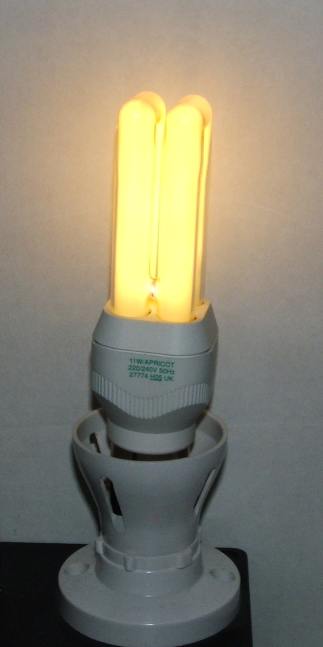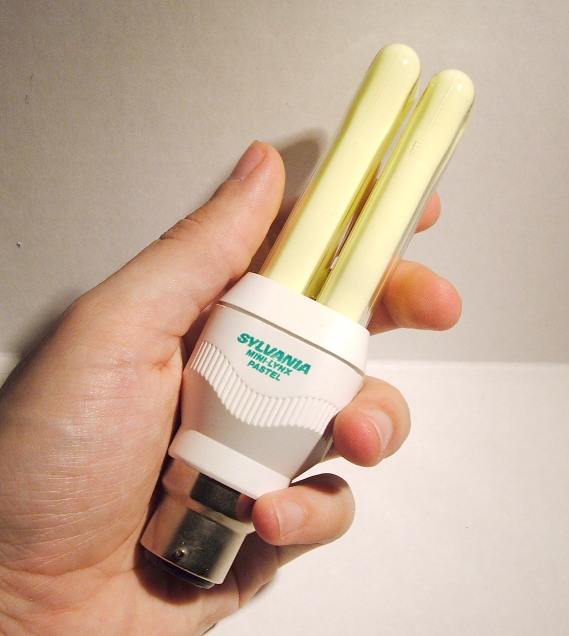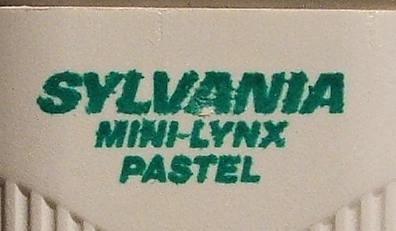
| Manufacturer: | Sylvania |
| Model: | Mini-Lynx Pastel - Apricot |
| Application: | General Lighting - decorative |
| Wattage: | 11W |
| Diameter (max): | 35mm |
| Length: | 135mm |
| Tube Length: | 240mm |
| Bulb/Tube material: | Glass, phosphor coating on inner wall, unknown composition, plus pale yellow dye |
| Colour Temperature: | Unknown |
| Peak output wavelength: | N/A |
| Total light output: | Not Stated |
| Rated lifetime: | 12,000 Hours |
| Cap: | B22 |
| Operating voltage: | 220-240V AC 50Hz |
| Operating current: | 97mA |
| Warmup/restrike time: | 2 minutes/none |
| Cost (original): | £14.75 |
| Place of manufacture: | United Kingdom |
| Date of manufacture: | July 1996 |
| Lamp Status: | Working |
| Related Pages |
By the early 90s, compact fluorescent's were starting to attain a foothold in the market...but not to a huge extent. They still tended to be bought by either the very environmentally conscious individuals or the energy-cost-conscious industrial sector. In fact, it's in a hotel that I first think I saw a CFL (which I now know to have been a Philips PL-C), as the energy savings and long lifetime there allowed twofold savings. The energy saving coupled with a reduced maintenance cycle would have presented an attractive saving, especially in a large hotel.
However, the fact that CFLs at that point in time tended to come in 3000K neutral white or 2700K warm white...with a colour rendering index in the mid 80s. Whereas this was the point that lighting manufacturers had just come up with the idea of making incandescent lamps with all kinds of colour tints to them, I distinctly recall seeing peach, apricot, rose, peppermint and bluish tints on the shelves in the supermarket. I can't remember what they called the blue one though. While this was a short-lived fad (though the peach ones seem to live on), it was a fad that was in progress while CFL manufacturers were trying to get into the market. When it was "trendy" to have tinted lighting in your house, this was one more thing putting the masses off buying those "boring" white CFLs. Sylvania however decided to see if a similar idea could work with CFLs, resulting in a variety of industrial lamps with lower than normal colour temperatures. While this was moderately successful, the very high price of the control gear and the lamps, plus the lack of convenience in having to use an external ballast, meant that it had little impact on the home consumer though.
As a result of this, Sylvania released two lamps based around the extra-warm phosphor formulation they had created for the commercial lamps, applying that phosphor to their existing Mini-Lynx electronically ballasted integrated lamps. Two versions were released, an apricot (featured here) and a rose version, both in 11W and 15W form (okay...so that's actually four versions...you know what I meant though!). While this was a high quality lamp, and did what it claimed to very, very well...Sylvania's relatively small presence outside the professional sector and the relatively high price of these lamps meant that sales figures never really took off. Unfortunately, this led to a very interesting range of lamps being withdrawn after only a few years.
The phosphor formulation of this lamp presently remains a mystery to me (though if you have anything to input to that, I'd welcome the information), though the function of the yellow dye (I assume it's dye - the phosphor may simply have a naturally yellow base colour though) is pretty clear. It reduces the intensity of the blue emission of the lamp (as the spectroscope photo below shows, the usual triphosphor emission in the mid blue is completely absent, that's visible even with my home made spectroscope), therefore increasing the relative red output of the lamp, lowering the colour temperature. The colour of the light from this lamp is really quite strange, quite unlike that from any incandescent or fluorescent lamp I have encountered in the past...I'll let the photos below do the talking though. The colour of the light, while interesting, isn't actually the best to work under, it's a bit too yellowish. The rose coloured lamp gives a rather more pleasing light - probably why it was the more popular of the two. I am however at a complete loss to make any suggestion to the chemical makeup of the phosphor. The attenuation of the blue output however does have a negative impact on luminous efficacy, lamps of this wattage generally coming in at somewhere between 50 and 60Lm/W, this one only managing to reach the mid 30s. Still far, far better than colour-corrected (or not for that matter!) incandescent lamps which it was competing against, halogen lamps of course do manage to beat this range of CFLs as far as efficacy goes though - not often you see that happen..
Electrically, there is nothing particularly noteworthy of this lamp. It's a conventional rapid-start electronically ballasted compact fluorescent, albeit a particularly good quality one.

Sylvania Mini-Lynx Pastel 11W Apricot Compact Fluorescent Lamp - General overview of lamp

Sylvania Mini-Lynx Pastel 11W Apricot Compact Fluorescent Lamp - Detail of lamp cap

Sylvania Mini-Lynx Pastel 11W Apricot and Rose Compact Fluorescent Lamps Shown Together

Sylvania Mini-Lynx Pastel 11W Apricot Compact Fluorescent Lamp illuminating a wall in my room from a distance of approximately two metres

Sylvania Mini-Lynx Pastel 11W Apricot Compact Fluorescent Lamp - Lamp shown while alight

Sylvania Mini-Lynx Pastel 11W Apricot Compact Fluorescent Lamp - Overview of lamp packaging

Sylvania Mini-Lynx Pastel 11W Apricot Compact Fluorescent Lamp - Held in hand to give sense of relative scale

Sylvania Mini-Lynx Pastel 11W Apricot Compact Fluorescent Lamp - Displayed next to ruler to show length of lamp

Sylvania Mini-Lynx Pastel 11W Apricot Compact Fluorescent Lamp Output Spectra

Sylvania Mini-Lynx Pastel 11W Apricot Compact Fluorescent Lamp - Detail of text printed on base of lamp (1/2)

Sylvania Mini-Lynx Pastel 11W Apricot Compact Fluorescent Lamp - Detail of text printed on base of lamp (2/2)
This lamp added to the Virtual Display Shelf on the 28th November 2007 at 21:13.
References: Lamp packaging and markings only. A lot of my knowledge of this lamp also came from a page on Lamptech, a website run by a fellow lighting collector and enthusiast.
Acknowledgements: Many, many thanks the website reader who provided this and a 11W version of the Rose lamp for display.
This page last updated:
16th June 2023: Some page format changes to improve readability on mobile devices and background code changes to improve search engine behaviour.